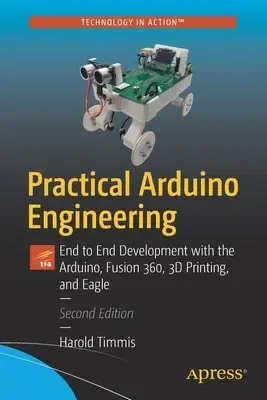Implement Arduino-based designs in your project, and build, debug, and
extend it using a solid engineering approach. This second edition is
expanded to provide a better understanding of the engineering process
and what it means to be an end-to-end developer.
You'll start out by reviewing basic engineering procedures, from the
fundamental requirements and preliminary design to prototyping and
testing. You'll then apply those principles to single devices like LCDs,
potentiometers and GPS modules, and move on to the integration of
several modules into a larger project, a sub-autonomous robot. This
robot will include devices such as GPS, Bluetooth, an OLED screen, an
accelerometer, humidity and temp sensor, motor drivers, and ultrasonic
sensor.
This version goes on to cover how to create 3D models with Fusion360,
make your own PCBs using Eagle, and use and maintain a 3D printer. Each
and every chapter exemplifies this process and demonstrates how you can
profit from the implementation of solid engineering
principles-regardless of whether you just play in your basement or you
want to publicize and sell your devices. With Practical Adruino
Engineering you'll be able to review and improve this process, and even
extend its scope.
What You'll Learn
● Set up the Arduino software landscape and project for testing
● Review the process of hardware engineering as applicable to Arduino
projects
● Create 3D models for 3D printing using Fusion360 in a robot chassis
project
● Make PCBs using Eagle and incorporate it into a sensor station shield
project
● Use and maintain a 3D printer with your own project
● Create Arduino shields in Eagle
● Debug Arduino projects of varying complexities via LabVIEW
● Use a special Arduino board for Bluetooth to control domestic and
mobile Arduino projects
Who This Book Is For
Primarily aimed at intermediate engineers or engineering students.
However, this book is also great for beginners and any maker who wants
to expand their abilities in a single book.

